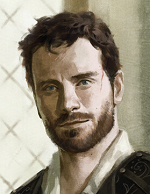1
Empress Celene strode into the University of Orlais’s great Chantry Courtyard surrounded by her entourage of servants and guards and flanked by Ser Michel, her champion. The entire faculty had been assembled to greet her, and the professors bowed at her approach.
In the wan morning light, the marble walls glittered like fresh-fallen snow. The stone tiles of the courtyard had been set with a mosaic of Andraste, proud and defiant in her mother-of-pearl armor with carnelian flames behind her. Celene noted with approval that the mosaic had been restored since her last visit, where she had seen that time and careless boots had knocked some of the stones loose.
The mosaic of Andraste stared with lapis lazuli eyes at the chantry that gave the courtyard its name. It was the tallest building in the university, displaying its dominance with a pair of shining bronze domes that the university students jokingly called “the bosom of Andraste.”
Not that the university chancelier had mentioned that to Celene, of course.
Over the great bronze doors, over a mural of Andraste and her disciples, a phrase from the Chant of Light had been set into the stone in gold: A LEARNED CHILD IS A BLESSING UPON HIS PARENTS AND UNTO THE MAKER. The university chancelier and his professors stood with heads bowed beneath the phrase as Celene and her entourage made their way across the mosaic of Andraste.
“Your Imperial Majesty,” Chancelier Henri Morrac said, and at a gesture from Celene, he and the other professors rose from their bows. “We are honored by your visit.”
“In such troubled times, Morrac, I find myself taking comfort in the knowledge and wisdom you and your university provide the future of Orlais.” Celene smiled and gestured to her attendants, and two of them produced a jumble of intricately wrought silverite that, with a few twists and turns, could ingeniously be shaped into a small but surprisingly comfortable bench.
Ser Michel stepped aside, his eyes taking in the walkways and windows set into the marble walls, alert for any threat to the empress but always projecting the air of confidence Celene required in those who served her personally.
Morrac started. He had clearly expected to invite her into his office, to discuss the reason for Celene’s visit in his place of authority and perhaps show off a new manuscript some promising student had uncovered. Beneath the comparatively simple mask he wore as a younger son of the Morrac family, his lips pursed in confusion and concern as he took a moment to reposition his approach to the conversation for an outdoor setting. Celene was quietly pleased to have him off balance so early.
The empress wore a creamy satin gown trimmed with ropy strands of pearls and woven with intricate patterns of gold set with amethyst to mark the colors of the Valmont family. Her position as empress dictated that this was the lightest and most comfortable gown she could wear in public except when she went riding, but it nevertheless weighed enough to crush her back and waist by the end of the day. She settled onto the small silverite bench, careful as always that no sign of relief or discomfort betrayed her.
She was aided in hiding her expression by the half-mask that all Orlesian nobles wore in public. It was inlaid with moonstone, and lines of gold suggested cheekbones and a nose. Tiny purple sapphires ringed her eyes, and dyed peacock feathers swept back from her head to ring her with a crown of gold and violet. The sapphires and feathers could be replaced with other colors to match a particular gown or represent a special occasion. Below the mask, the empress’s face was powdered white and her lips were lined with deep red.
“If Your Imperial Majesty wishes,” Chancelier Morrac began, “Professor Doucy would be pleased to give a reading from his dissertation on the inferiority of Qunari society. It is a bold attempt to expand upon Brother Genitivi’s earlier writings, and if I recall correctly, you found his earlier work quite promising.”
“That does indeed sound lovely,” Celene said, and waited until Morrac had half turned to one of the professors on his right before adding, “but I find discussion of the great horned rulers of Par Vollen somewhat stark on a day already beset by the promise of winter’s chill.” As he jerked back to attention, she added, “Perhaps one of your professors could entertain us with a study of mathematics. I have, in my own simple way, been struggling with Vyranion’s Theorem, and I would be quite grateful if one of your learned scholars could explain the process by which it is proven.”
For a moment, the great courtyard was silent but for a few birds which, fed by students or groundskeepers, had elected not to fly south for the winter.
Chancelier Morrac swallowed. Even as a younger son, he should have had better composure. Celene wondered idly whether his open expression had led his family to banish him from the dangers of the imperial court to the scholarly life, or if he had forgotten his courtly training since coming to the university. In either case, it spoke ill of him.
“Your Radiance,” he said finally, “you think too little of your own scholarly pursuits. Vyranion’s Theorem is exceedingly complex. I confess, in my own mathematical studies, the waves of my intellect have broken upon its rocky shores with little result. However, if you seek a mathematical demonstration, I have devised a treatise upon a specific ratio found in nature so often that it must reflect the Maker’s own hand. I would be honored to—”
“Tea?” Celene asked, and gestured to one of her attendants, who produced an elegant silver pot inscribed with runes that kept the water within hot with no need for a fire. Another servant drew forth cups and saucers of Antivan porcelain so fine that the morning sun shone through them. “Surely one of the other professors has mastered Vyranion’s Theorem. The University of Orlais can hardly be the most learned institution in Thedas if we cannot understand the work of a simple Tevinter scholar.”
Chancelier Morrac looked affronted at that. Perhaps the man had not totally lost his noble pride after all. “I assure you, Your Radiance, the University of Orlais is unparalleled in its pursuit of knowledge and culture, due in no small part to the fact that Tevinter scholars are but slaves to the mages who rule them. In granting us freedom from pressures religious or political, you have empowered us to further Orlais’s culture.”
Yes, Morrac still remembered enough courtly training to throw the occasional barb. Celene was pleased to see that the conversation might be interesting after all. “One of your students, then? When I went riding with Comtess Helene last year, she told me that she was sponsoring a young man whose mathematical abilities were nothing short of prodigious.” She took the teacup her servant offered and took a small sip. “Now that I think upon it, he was studying Vyranion’s Theorem, and the discussion led me to peruse it myself. Lennan, I believe, was the young man’s name.”
“Ah, yes,” said Morrac, his gaze going flinty as he saw where Celene was headed, “I think I remember his application. And while of course our doors are open to any who, through noble blood or proper sponsorship, are able to ensure that they will continue our distinguished traditions—”
“Tell me, Morrac,” Celene said, and paused to sip her tea. “You study mathematics. Are you familiar with the number zero?”
It was excellent tea, a Rivaini blend of cinnamon, ginger, and cloves, sweetened with honey just as Celene liked.
“Yes, Your Radiance,” Morrac said after a moment of silence, when it became clear that the question was not rhetorical. He took the teacup Celene’s servant offered him with scarcely concealed irritation.
“Excellent. That is the number of students at your university who do not come from noble blood. I confess to some disappointment in that matter, Chancelier Morrac, as I had hoped to see some improvement since our last talk.”
“Your Radiance—”
“Drink your tea, Morrac. I have not asked you to let peasants scurry through your halls. I have asked you to admit commoners who obtain sponsorship from a noble who recognizes in them some intelligence that transcends blood and offers a chance for Orlais to become greater through their studies.”
Morrac’s knuckles were white on the saucer he held. “The young man you spoke of, Your Imperial Majesty, was an elf.”
Celene turned to her champion, Ser Michel de Chevin, who was regal in silverite armor enameled with the imperial coat of arms. His own family’s coat of arms was inset just above his heart, while his mask was a simpler reflection of Celene’s own. “Ser Michel, I believe the chevaliers are renowned for their keen eyes. Tell me, is there not an elf already present with us in the courtyard?”
Ser Michel smiled slightly. “In a manner of speaking, Majesty.” He pointed at the chantry, specifically the mural over the great bronze doors. “If I am not mistaken, that mural is a faithful reproduction of Andraste and her disciples by the legendary Henri de Lydes. At the time Henri created the original, the elves were still considered allies, as they had not yet attacked and betrayed Orlais. Twenty years later, when Divine Renata called for an Exalted March against the elves, she also ordered the destruction of all Chantry art that included elves.” He smiled. “But Henri de Lydes pleaded with such grace and passion that she relented and allowed this single piece to survive, provided that Henri cropped the ears of the now-heretical disciple Shartan.”
Celene inclined her head gratefully. “Ah, yes. And it seems the university has copied the original piece quite faithfully. Can you point out Shartan, Morrac? The ears have been altered, but the large eyes make it quite clear.”
Morrac looked at the mural, then back at Celene. “Of course, Your Radiance. Unlike the Chantry, the university prides itself on creating an accurate vision of history. That is indeed the elf whom Andraste freed from servitude to the vile Tevinter Imperium.”
“How strange that the university, so eager to fight against pressures religious to limit its field of studies, would in this matter be unwilling to bend even as far as Divine Renata herself.”
“It is a puzzle, Majesty,” Ser Michel said, and looked over at Chancelier Morrac.
The chancelier took a long sip from the teacup, then set it back in its saucer, the porcelain clinking as his cup rattled. “We would of course be honored to review Comtess Helene’s application again.”
“Orlais honors your commitment to our culture and scholarship.” Celene inclined her head and stood. One attendant took the small silverite bench and collapsed it behind her, and Celene handed her cup and saucer to another. “Now, after this talk of matters religious, I believe I would like to spend a moment appreciating the lessons this chantry can teach. See that I am not disturbed, Chancelier Morrac.” Then she smiled, and as a peace offering, added, “When I am done, I would indeed be interested in hearing more about this ratio you say shows the hand of the Maker.”
The professors bowed and hurriedly stood aside as Celene approached the great bronze doors. Celene’s own servants held back as well, save Ser Michel.
“You might have informed me of the turn you expected the conversation to take, Majesty,” he murmured. “The Heresy of Shartan is not precisely common knowledge.”
Celene smiled without looking his way. “I had faith in you, my champion.”
“Shall I accompany you inside?”
“I believe I will be safe enough in the bosom of Andraste,” Celene said as Ser Michel pulled the door open. Michel looked inside, taking in the room and assessing any potential dangers, then turned to her and nodded, and she walked in alone.
The air was cool inside, though without the chill of the autumn wind, it was more comfortable than it had been outside. The stained-glass windows cast beams of crimson light across wooden benches whose oiled scent filled the chantry. At the far end of the hall, the eternal flame burned brightly in a great golden brazier, the only other light beyond the windows.
The chantry was empty save for a red-haired woman in a lay sister’s robes, who rose to her feet as Celene came forward. “Your Imperial Majesty,” she murmured, bowing deeply.
Sparring with Chancelier Morrac over the elves had been a gentle prelude to the real test of the morning. Celene gestured for the woman before her to rise. “I am glad the Divine was willing to meet.”
The red-haired woman smiled. She was unmasked, as those who served the Chantry most often were, and while she spoke with a native Orlesian accent, her features were Fereldan. The masks were part of the Game, the ruthless and endless contest by which dynasties were founded and lost in Orlais, and the Chantry’s insistence that their people go unmasked was meant to suggest that they were beyond politics. It was a suggestion that few in Orlesian nobility took seriously. “The matter at hand is, as your messenger said, quite serious, and the Divine would like to see it resolved. I am her voice in this regard. You may call me Nightingale.”
Beneath her mask, Celene raised an eyebrow. The Empress of Orlais was rarely asked to address someone by a pseudonym. Still, Justinia would only have sent someone she truly trusted.
Without ceremony, Celene sat down on one of the benches, her creamy satin gown bunching awkwardly and amethysts jangling against the wood. “You are familiar, Nightingale, with the tension between the templars and the mages?” When Nightingale hesitated, Celene waved for the other woman to sit as well.
“Of course, Your Radiance.” Nightingale sat, moving with a casual grace and coming to rest with her simple robes unwrinkled and unbunched. The subtle series of movements was the mark of a trained bard, and Celene filed the observation away for use as needed.
“The templars have become even more restless since what happened in Kirkwall,” Celene said, staring at the brilliant red light of the stained-glass depiction of Andraste on the pyre. Years of training let her see the woman beside her clearly at the edge of her vision. “As have the mages, for that matter. What does Dorothea intend to do?”
She had used Divine Justinia’s given name deliberately, and saw, from the corner of her eye, as Nightingale reacted. The woman’s eyes narrowed a tiny fraction, while her posture remained unchanged. Anger, then, but no insulted propriety. Nightingale might call the Divine by her given name, might well have known her before she rose to the position.
All this passed in a heartbeat as Nightingale said, “The Divine does not wish to assume that what transpired in Kirkwall was anything more than the actions of a single mad mage driven to tragic action by overzealous templars. You know that in some Marcher city-states, mages face more restrictions than they do in Orlais.”
“I do,” Celene said, “and I also know that you have not answered my question. If Dorothea proposes to do nothing to unite the templars and the mages, she is following in the footsteps of Grand Cleric Elthina, who waited and prayed while Kirkwall tore itself apart.” She turned and faced Nightingale directly.
The other woman had reacted again at the use of the Divine’s given name. “Justinia wishes to see this world made better, Your Radiance. We gain nothing by acting capriciously.”
“Sometimes events do not allow us the time we wish, especially when magic is at play.” Celene looked at Nightingale, who sat as a proper lady, relaxed and poised in her simple robes, and made a guess. “I understand that during the last Blight, the Circle tower in Ferelden was nearly lost when one of their senior mages became an abomination. After killing the creatures, the Hero of Ferelden was forced to decide on the spot whether to kill every remaining mage in the tower.”
Her barb struck home, as Nightingale blinked, then said with heat, “We are hardly in the thick of battle, Your Radiance.”
“We are always in battle,” Celene said. “It is only that some of us do not always realize it. A bard named Marjolaine once told me that. I heard she met an unfortunate end in Ferelden.” She sighed. “Isn’t that sad, Nightingale?”
Nightingale paused for a moment, looking at Celene with cautious respect. “I suppose,” she finally said, “it is a matter of perspective. And perhaps you might call me Leliana.”
“Perhaps I might,” Celene said, and smiled before lowering her voice and continuing. “Divine Justinia must know this: I have nobles begging in private salons for the throne to take direct action in this matter.” At Leliana’s shocked look, she nodded. “There are men of Orlais who would sooner see us march upon our own people in the name of safety. I would despise that. Dorothea knows that I would. But I must offer them some alternative.”
Leliana stood, frowning in thought. “You wish the Divine to make some overt show of ameliorating the situation.”
Celene let out a breath. “In truth, any overt show will bring complaints that I have allowed the Chantry free rein to rule this empire for me,” she said, and Leliana nodded wordlessly. “But if Justinia can calm tempers before I am forced to turn the blade of the empire upon itself, then I will pay such a price willingly.”
Leliana smiled. “You think less for yourself and more for Orlais than I had expected, Your Radiance. It is a fortunate quality in a ruler, and one I have not seen enough.”
Celene stood as well, and for a moment her gown was bathed in the crimson light of the stained glass. “Tell me something. How large was the Archdemon?”
Leliana laughed the delicate cultured laugh of a noblewoman or trained bard. The effect made her sister’s robes look like a poor disguise. “Large enough, Your Radiance, that after having seen it, most problems seem small by comparison.” Her face turned serious, and she added, “I will ask Justinia to consider acting directly. She will want your support, to head off accusations that she might be attempting to steal power for herself.”
“Of course. Perhaps if she made a statement at a ball thrown in her honor?”
Leliana considered it. “It is not the place where one would expect her to make such a pronouncement…”
“Which is why you like the idea,” Celene said, smiling. “It will also ensure that many of the nobles petitioning me for action will have little choice but to hear her words and know that the matter is being attended to.”
Leliana grinned. “You were trained as a bard as well, Your Radiance. It is easy to forget. I shall take the proposal to the Divine.”
“Three weeks,” Celene said, “or at most, a month. Any longer, and I will have no choice but to act. The nobles will want some sign of resolution before they retire to their winter homes.”
Leliana bowed. “Your Imperial Majesty.”
The Divine’s spy left through a hidden side door, and Celene sat back down on the bench. This time, mindful of her training, she sat without making a sound or wrinkling her gown in the slightest.
Three more weeks of gritting her teeth and dealing with Grand Duke Gaspard, who agitated with the other nobles in an attempt to start a war. Three weeks of trying to ignore the idiotic arguments started by thuggish templars and mages who refused to see the way of the world.
And her reward for perseverance would be Gaspard bellowing that she had let the Chantry have more power, as though power was a sword only one person could hold at a time. It was not. Power was a dance to be navigated with partners, knowing when to lead, when to follow, and when simply stepping on the hem of a rival’s gown could send her to the ground in shame.
In careless hands, such power could bring down the greatest empire in Thedas. The culture and history of all of Orlais was Celene’s to protect.
It was at times like these that she enjoyed the simple pleasure of bending a recalcitrant professor to her will. “Three weeks,” Celene said, and allowed herself a moment to watch the fiery light play through the stained glass.
* * *
The half-masks that the nobility wore in public were always mirrored by the masks of their servants, albeit less extravagantly, and with less variation than the nobles, who could often afford different masks as the needs of fashion dictated. If a lord’s house mask was a lion carved from ivory and inlaid with onyx and gold, his servants’ masks would be lions as well, painted black and lined with brass. The masks protected the servants when they were about, warning tradesmen and merchants that any offense given to the servant was potentially an offense to the servant’s master. To servants of other houses, the masks were a way to instantly recognize a potential ally … or a potential enemy.
The masks worn in the royal palace at Val Royeaux by servants who were to be seen in public mirrored the one worn by Empress Celene. Where hers was inlaid with moonstone, theirs were simply enameled, or inlaid with ivory for the highest-ranking servants, and the gold and violet were simply painted on. Below the half-masks, the servants of Val Royeaux painted their faces white, a mark of additional status.
To a visitor, looking at a sea of pale faces trimmed with gold and violet, the servants were almost identical. The women wore serving dresses, the men tight breeches, both cut in the latest fashion and dyed in the royal colors. Only the guards and the servants who were never meant to be seen—the cook and her assistants, for example, or the laborers who cleaned the privy—had their faces visible.
But the goal for the half-masks that every servant wore was pageantry, not anonymity. Otherwise, the mask would have covered Briala’s elven ears.
“You, there! Rabbit!” called the chatelaine as Briala passed the great hall.
Briala turned. “Mistress?”
“Turned you out, did they?” The chatelaine looked back to the great hall, where servants on ladders were adjusting a great purple banner so that the golden lion of Empress Celene’s House Valmont would hang at the proper height. “It may be acceptable to have you dress Her Imperial Majesty on a normal day, but for a ball, they’ll want everything proper.” She squinted. “Higher on the left!”
Briala had seen the chatelaine prepare for countless balls before. The woman was always angry and snappish at the time, taking out her anxiety on anyone she could. Today felt different, however. Her barb had little heat behind it, and all the servants knew that Briala got on well with the girls who dressed Celene for the most formal occasions. She had to, lest they become rivals.
What was more, a few stray locks of the chatelaine’s hair had been caught under her mask, a faux pas that was completely unacceptable for any servant in the imperial palace. The chatelaine could not have failed to notice it unless she had removed her mask and then put it back on quickly.
“Yes, mistress,” Briala said. She had been Celene’s handmaid since childhood, when the empress had just been one girl among countless rivals for the throne. Now, in Val Royeaux, Briala was one of the few elves who had been granted the mask of public service.
“Well, you can make yourself useful, then. Run to the kitchen and speak with the cook and her girls. The weather has been dry, and I won’t have the meat go dry along with it.” She turned back to Briala. “Last autumn, Lady Montsimmard said that the Circle of Magi served better duck than we did.” She glared, the narrowing of the eyes visible through the slits in her mask. “Tell the girls that if this happens this year, I’ll have them whipped.”
“Yes, mistress,” Briala said again, ducking her head to make her respect clear. The hierarchy among the palace servants was strict and clear, and while Briala’s status as Celene’s personal handmaid set her off to one side of the chain of command, she was by no means free of it completely.
“Oh, no need to worry, rabbit.” The chatelaine patted Briala familiarly on the shoulder. As she did, Briala saw that the clasp on the other woman’s cuff was unfastened, another mistake that the servants who dressed the chatelaine would never have made. “It’s just to put the fear of the Maker in the lazy things. We’d never whip you. Off with you, now.”
“Yes, mistress,” Briala said for the third time, and left as the chatelaine began yelling at the servants to lower the left side of the banner.
As she strode down the great hallway, the floors covered with fine Nevarran carpet and the walls lined with classical paintings and curls of swirling stucco, Briala thought.
The chatelaine had served Celene faithfully for more than a decade. She cared deeply about her job, and would never allow herself to be distracted on the day of a ball unless she were somehow compromised. The clasp and the stray hair suggested a new lover who had pressed his or her suit and taken a few moments of the chatelaine’s time.
It could have been nothing more than that, of course, but in Val Royeaux, everything was part of the Game, even the clandestine affairs of the more important servants. Briala had grown up watching the Game, and as one of Celene’s pieces, she was determined to win.
If Briala assumed the worst, the chatelaine would not knowingly be involved in the matter. An embarrassment to Celene would bring embarrassment to the chatelaine as well, and if, Maker forbid, Celene died or lost power, the chatelaine would doubtless be replaced. If this was something more than an overeager new lover, the chatelaine was a tool, not an active member of whatever plot was unfolding.
The question was whose tool.
The heat in the kitchens was stifling, as dishes from all across the known world were prepared. The cook, Rilene, was a heavy, ruddy-faced woman whose thick forearms were burn-scarred from an accident in her youth—if the result of the former chatelaine’s thinking that Rilene was becoming presumptuous could be called an “accident.” Briala liked her, and she did what she could to protect the woman, who was better at making pastries than she was at the intricacies of the Game.
“Miss Bria!” Rilene called out, beaming, as Briala came in. “Does Her Radiance need something to last her until the evening banquet? We’ve some lovely pastries from Lydes.”
“Thank you, Rilene, but no.” She looked at Rilene’s girls, some human but many of them elven, and none of them masked. They were not to be seen by the nobles. “The chatelaine had concerns about the duck. She was … very emphatic.”
Rilene gave her a grateful nod. “I will see to it personally.” She dusted flour off her scarred hands and moved over to a pot, where a roasted dish was simmering in sauce.
“And if you could send one of the girls to find out any last-minute schedule changes the chatelaine has made…?” Briala asked.
“Of course, Miss Bria.” Rilene smiled. “I’ll have her find you.”
“Thank you.”
Briala left the kitchens and made her way around the palace. In the great hall, the chatelaine had finished with the banners and was now yelling her way through the organization of the tables. The elaborate card rooms bordering the hall had each been decorated in the style of a different country, from the great bearskin rugs and golden mabari statuettes of Ferelden to the decadent silks and magical lamps of Tevinter. The balconies offered a view of the great hall, as well as an escape to fresh air outside, where verandas overlooked a hedge maze dotted with sparkling marble fountains.
“You, there! Knife-ear!”
Unlike “rabbit,” which was usually spoken with a friendly condescension that only made Briala grit her teeth a little, “knife-ear” could never be mistaken for anything but an insult. It was what a human might use to address gutter trash that was too lazy to work and too stupid to steal.
The captain of the palace guard did not wear a mask. None of the palace guards did. It would be too easy for an assassin to blend in and get close to the empress while armed and armored. His face displayed the long angles that spoke of noble blood, and beneath his surcoat, emblazoned with the golden lion of House Valmont, his ceremonial breastplate gleamed.
More important to Briala, one of the buckles on his breastplate was askew, and he had the welt from a love bite just below one ear.
“Trying to sneak around and dodge your duties, knife-ear?” he said with a sneer.
“The empress bade me examine the preparations for tonight’s banquet.” Briala did not bow. As the captain of the guard, he was important enough that she should, but Briala had enough power to skirt the rules when she truly wanted to—and at the moment she truly did.
“A pretty story.” He sniffed, and then examined her with new interest. “Though if you’re keen to find some distraction, you’ve a fair enough form that I might ignore those flaps of filth jutting out from your head.” He stepped closer, blocking her view of the garden. “Perhaps I might even hold them like reins.” He smelled of sweat as well as lavender, the chatelaine’s favorite scent.
She stepped back inside. “I doubt the empress would approve.” She turned and left without a backward look, still thinking.
The captain of the guard was carrying on with the chatelaine, and his attentions had clearly been meant to harass her until she left, to distract her from looking down at the hedge maze below … which was why he had moved to block her view. From what Briala remembered, the captain had been brought in recently after his predecessor had died. Before that, the man had served in the military. Briala didn’t know where, but given Grand Duke Gaspard’s popularity with the soldiers …
She knew who and where. All that was left was to find out what.
She hurried down a curving staircase whose marble steps were carpeted with red velvet, but a call from behind stopped her before she reached the doorway leading out to the hedge maze.
“Miss Bria!” Briala turned to see one of the elves who worked in the kitchen hurrying her way. “I was told to find you.”
“Thank you, Disirelle.” Briala smiled at the young woman. “What have you found?”
Disirelle lowered her voice and tugged at her sleeve nervously with thin fingers. “The chatelaine added a bard, Melcendre, to tonight’s guest list.”
Briala nodded. “Thank you. Now, if Rilene can spare you for another moment, may I ask you to find out what the captain of the guards has been doing today?”
“Of course, Miss Bria. Rilene said that I was at your disposal.”
“Good.” Briala turned to the hedge maze. “I will be in there, hunting.”
* * *
Celene had seen the Orlesian chevaliers train. One of their most famous tests, at least among those tests they showed in public, was a series of blades mounted on posts in a great wooden scaffolding. When servants worked at a massive hidden wheel, the blades would spin and slash, attacking anyone who passed with dizzying speed. Brave youths at summer festivals would try to rush through in heavy padded tunics, the blades blunted so that most contestants broke no more than their pride. In real tests, it was said, the blades were sharpened, and the soldier ran the gauntlet unarmored.
That gauntlet was always how Celene imagined the formal banquets.
Fortunately, she did not run this gauntlet alone. Her champion, Ser Michel, was a pace behind her, as always, unarmored so as not to cause a disturbance as Celene navigated the crowd, but carrying his blade nevertheless. His hose were rich golden silk and his doublet was violet suede made from beasts the dwarves raised like cattle. His scabbard was ornamented with an inlaid lion of gold with purple sapphires for the eyes and mane, and while his hands were bare of the rings and bracelets other nobles favored—he would allow nothing to impede his ability to handle a blade—he wore atop his mask the tall yellow feather of the chevaliers.
“Orders, Majesty?” he asked in a voice low enough to carry only to her. Michel usually spoke little at these events, which Celene appreciated. As her champion, he was an extension of her public presence, drawing attention not to himself but to her. He cared little for the Game, but he had good eyes and followed orders. He had been with her for almost ten years, since her last champion had died stopping an assassin.
“Briala passed along what she found?”
“The sword in the bushes? Yes, Majesty.” He kept his voice low and calm, and by his body language, they might have been discussing the lovely wyvern ice sculptures at the refreshment tables.
“Watch the bard, Melcendre. It will begin with her.”
“Hopefully I will not be expected to pass any tests of religious iconography this evening.”
Celene checked a smile. “I will attempt to warn you this time should the need arise.”
As Gaspard’s bard, Melcendre, sang in a lovely voice about the end of summer and lost loves, Celene moved through a field of allies and enemies, well wishers and would-be rivals.
“Your Radiance.” Comte Chantral of Velun bowed at her eye contact, the motion making the string of black pearls attached to his nacre mask rattle. “Your light will keep the birds from departing this autumn, for they will think the summer lingers.” Chantral had been pressing for her hand in marriage for some time now. Given his apparent loyalty and clumsiness in the Game, Celene kept him at a comfortable and friendly distance without ever completely dashing his hopes.
Celene’s ivory gown was cut low, and against her pale skin a yellow diamond glittered in a rich golden setting. The gown complemented the great jewel, as teardrops of amber flowed from her bosom in ribbons of yellow that darkened to gold at the hem and wrists. Her mask was identical to the one she’d worn that morning, save that the feathers had been switched to gold filigree.
“Your kindness is as soothing as the warm waters of Lake Celestine,” she said, “and though I fear the birds must depart or die in the winter chill, I know they will grace the skies of Velun come springtime.”
She moved on and caught the eye of Lady Montsimmard, whose mask was set with glowing lyrium crystals on each cheek, a gift from the First Enchanter in the Orlesian Circle. “Cosinne,” she said with friendly familiarity as the other woman gave a deep curtsy. “It has been too long. Tell me, how did you enjoy the duck?”
“The sauce was divine, Your Radiance.” Lady Montsimmard and her husband had entertained Grand Duke Gaspard during the summer, and in past years had held out the family’s proximity to, and control of, the Circle as a bargaining chip. Celene found the husband dangerous and the wife dull, and suspected that Lady Montsimmard did not realize how precarious the situation with the mages had become. Her guess proved true as Lady Montsimmard added, “Though in truth, when we visited the Circle of Magi—”
“Oh, I should have a care when dining with them,” Celene cut in with a light laugh. “It seems that when they try to prepare a meal, everything around them ends up burned.” She moved on as Lady Montsimmard stammered out her farewell with a strained smile. Behind her, Celene knew without looking that Ser Michel had fixed Lady Montsimmard with a disapproving stare, a wordless reminder that Celene could laugh and play the Game, or, if she chose, she could have Lady Montsimmard’s head mounted on a pike. She made a note to speak to Madame de Fer, the Mage of the Imperial Court, about Montsimmard’s familiarity with the mages.
On and on she went through the crowd, trading greetings and kind words laced with poison. Should Orlais push for more advantageous trading terms with Ferelden while the upstart kingdom was still recovering from the Blight? What was to be done to ensure that nothing like Kirkwall could happen here? Was the university where noble sons came to study truly going to start admitting knife-ears? Celene’s jaw ached from smiling—it was the clearest expression visible below the half-mask and under the layers of makeup that covered her face. Beneath the bladed words, Melcendre’s beautiful voice continued.
Then, finally, the pageantry ended with the laughter of Grand Duke Gaspard.
It was a deep, booming bellow that had echoed across battlefields. It silenced the timid and the servants like a death knell, and pulled the other lords and ladies into chuckles with its weight.
The crowd before Celene parted, showing a clear path to the grand duke and the dark-haired bard before him. Melcendre was unmasked, though she wore the heavy makeup commoners donned at noble gatherings, and she had turned away in embarrassment at whatever Gaspard had said.
Celene steeled herself without any outward change of expression. She had played the Game for most of her life. No matter how prepared she was, no matter how much she had considered and planned and determined her strategy, there was always one moment of fear.
Then the moment was over, and she was moving toward the bard who had been surreptitiously added to the guest list at the command of a guard captain loyal to Gaspard. Ser Michel’s steady footsteps moved in time with hers, the large man matching her pace perfectly.
Melcendre was good, Celene noted, but not perfect. The makeup covered the fact that she could not effect the blush that would signal actual embarrassment, but she would have been smarter to add red makeup at the cheeks to give the assembled nobles the impression anyway. Seeing that little imperfection—not even a mistake as such, but a detail that Celene could have done better—somehow made everything seem easier.
“And with what wit has my cousin silenced so sweet a voice?” Celene asked into the expectant silence.
Melcendre paused, uncomfortable, but Gaspard dipped his head, a bow just barely sufficient to avoid undeniable insult. “Your Imperial Majesty,” he said, still chuckling, “I was pointing out that the young lady’s song had a melody similar to ‘King Meghren’s Mabari.’”
The assembled nobles tittered, scandalously amused. Celene kept her smile in place. It was a good first strike. The song had been popular and harmless decades ago, during the Orlesian occupation of Ferelden. It told the story of the unhappy Meghren, sent against his will to Ferelden by Emperor Florian. In the song, the hapless noble was comically frustrated at every turn by rough Fereldan culture, including a slobbering mabari hound that ate his mask.
While never forbidden, the song had lost its popularity after King Maric of Ferelden killed Meghren. Since coming to power, Celene had done her best to strengthen ties between the two countries, and the song mocking the crude Fereldans and their uncultured customs had never come back into fashion.
Until now, it seemed.
“I remember singing this with the men during marches,” Gaspard said. “It took us back to the days when Orlais stood poised to conquer the world. Poor Meghren, trapped far from the Maker’s gaze, trying to make himself at home among the dog-lords.” He was a tall man, broad in shoulder, and his doublet and hose were cut with hard lines and silver trim to give the impression of armor. His mask was gold, set with emeralds to match his family’s heraldry, and a tall yellow feather sprouted from the mask—like Ser Michel, he was a member of the chevaliers.
He was also standing not ten paces from Bann Teagan Guerrin, the Fereldan ambassador. The man’s face, bare of makeup, clearly showed his anger at hearing his people called “dog-lords.”
“It was a sad time for all of us,” Celene said, turning to the ambassador with a smile, “and Orlais is pleased to count Ferelden as a friend in these trying times.”
Teagan smiled gratefully and bowed. “Your Imperial Majesty, Ferelden hopes the same.”
“Of course.” Gaspard strode forward. “What’s past is past, eh, Teagan? And now we’re just two old warriors.” He clapped the Fereldan on the shoulder, and Bann Teagan stiffened at the familiarity.
“Did you bring your dog with you to Orlais, my lord?” Melcendre added, the dark-haired bard the very picture of innocence, even as the crowd chuckled.
Teagan turned to her, fists clenched at his sides. “Yes, though not to this ball. I doubt he’d appreciate the food.”
That got a laugh from the crowd. While not a master of the Game, the Fereldan noble was smart enough to see when he was being set up and to try to get the crowd on his side.
“Someday I’ll have to see your dog, Teagan,” Gaspard said, not to be distracted from his play. “But tonight, in celebration of the friendship between our empire and your, ah, kingdom, I brought something for you.” He snapped his fingers, and a servant rushed up carrying a long bundle wrapped in rich green velvet.
Gaspard took the package and handed it to Teagan with a wide smile. Reluctantly, knowing he was stepping into a trap but unable to find a way to avoid doing so, the ambassador unwrapped the package.
Inside, as Briala had informed Celene earlier in the afternoon, was a sword. It was Fereldan in make, largely functional but with a few hints of ornamentation around the hilt and cross guard to suggest that it was the fighting blade of a noble. It was worse for wear, with nicks along the blade and a few spots of rust.
“Grand Duke Gaspard!” Michel moved to put himself between Celene and the sword. The weapon should never have made it into the hall—guards at the palace entrance checked all packages to prevent an assassin from bringing a weapon inside. Which was, Celene reflected, why Gaspard had gone to so much trouble to get the package smuggled in and hidden in the hedge maze earlier that day.
“At ease, chevalier.” Gaspard eyed the blade. “I’d as soon come at someone with a fireplace poker as I would wield that thing.” He nodded to Bann Teagan. “It was taken off the body of some Fereldan noblewoman who got caught making trouble for poor Meghren. Moira, I believe.” Behind his gold and green mask, his eyes twinkled with good humor. “Our servants had been using it to kill rats in the cellars.”
Teagan had gone still, looking at the sword in his hands as though the rest of the court had vanished. The green velvet bunched around his white-knuckled fists.
“That was a noble’s sword?” Melcendre asked, adding just the right touch of doubt to lure the crowd into laughing at the battered blade and drive Teagan further toward saying something that Gaspard could construe as an insult.
It was a simple play, but an effective one. Bann Teagan would be goaded until he said something in anger. Then Melcendre would gasp in shock, to ensure that even the dimmest nobles understood that they should take offense. Celene would then get to choose between having Ser Michel challenge Bann Teagan to satisfy Orlais’s honor and saying nothing, allowing Gaspard to brandish his chevalier’s code of honor and deliver the challenge himself. Either result would sour relations between Orlais and Ferelden, moving them closer to another foolish war.
War was where Gaspard shone brightest.
All this crossed Celene’s mind, even as Gaspard twisted the knife. “Well, she called herself the Rebel Queen. Closer to being a bandit or a mercenary captain, really. She thought she could drive us out of Ferelden.”
“And she was right,” Teagan said, still not looking at Gaspard. “Her son Maric drove you all out of our kingdom.”
“Shame Moira didn’t live to see it,” Gaspard said, looking around the room with a grin. “Perhaps if she’d had one of your big dogs…”
A few nobles laughed. It was just enough to drive Teagan over the edge. Celene saw his shoulders tense, saw him open his mouth to say exactly what Gaspard had been waiting for.
“Bann Teagan,” she called out. She had ruled the greatest empire in the world for twenty years, and she knew how to send her voice slicing through a crowd to drive it to silence.
Mouth still half open, the Fereldan noble turned to her.
Because she and Gaspard had played the Game for long enough to be old familiar enemies, she gave her cousin a tiny smile before stepping forward. Excellent try, the smile said, and next time, perhaps you will be clever enough to succeed … but not tonight.
“Your Imperial Majesty.” Bann Teagan stood ready, the veins in his neck taut.
“I see from your expression that this blade has awakened old feelings in you. Has Orlais given you offense in the death of Moira Theirin, Rebel Queen of Ferelden?” As the crowd took a collective breath, she added, “Do you demand satisfaction?”
Teagan looked down at the blade in his hands, and then over at Gaspard. And finally, because he might have been lackluster at the Game, but he was not a fool, he looked at Celene herself, judged her stance, and quietly said, “I do.”
As the crowd erupted into yells, Celene smiled. Gaspard closed his eyes and shook his head, already knowing that he had lost, while his bard, Melcendre, looked to him in confusion, clearly uncertain how she was supposed to pull the crowd now.
Celene looked over at Michel and gave a tiny nod, and her champion drew his blade. The yelling of the crowd of nobles went silent at the sight of bared silverite shining blue in the grand ballroom.
“Then satisfaction you shall have,” Celene said to the Fereldan ambassador. “Ser Michel?”
“Your Radiance?” Michel asked, blade drawn, never taking his eyes off Bann Teagan.
“We have been challenged, and you are my champion. Do you stand ready to defend the honor of Orlais in a duel between men of noble birth?”
Without pause, Ser Michel said, “I do not, Your Radiance. Since we are the challenged party, it falls to us to choose the weapons used in this duel. We may not proceed until we do so.”
“Ah.” Celene paused for a moment, letting it build. “I see. I would be loath to stain the still-mending friendship between our two nations with noble blood shed in defense of past slights.” She turned to Bann Teagan. “Thus, as is my right, for the weapons in this duel, I choose … feathers.”
“Very good, Your Radiance,” Ser Michel said, and without hesitation, he plucked the tall yellow feather from his mask.
The nobles in the crowd were fickle, bloodthirsty, and vain, but above all, they were hers. As much as they would have enjoyed the scandal of a bloody duel, they admired a good display of wit. As Ser Michel brought his feather up with the crisp precision of a master swordsman, the nobles burst into delighted laughter.
Bann Teagan visibly relaxed, dropping the velvet-wrapped bundle to his side and giving Celene a relieved smile. “Your Radiance, I regret that I am unarmed for a duel of this nature. You may note that my nation prefers fur to feathers.” When he raised his fur-trimmed sleeves, he even got a laugh from the crowd.
“Quite so.” Celene looked over at Gaspard, who had assumed the polite smile one used in court to deny one’s enemies the satisfaction of a snarl. “Cousin, you have shown your generosity to our cousins in Ferelden with your first gift tonight.” She raised a hand and gestured in gratitude. “Would you be so kind as to offer a second?”
Gaspard blinked, then bowed. “Nothing could please me more,” he said, and with a quick and controlled gesture, he plucked his own feather from his mask.
Then he handed the yellow feather, the honored symbol of the legendary Orlesian chevaliers, to the Fereldan dog-lord he had just insulted.
As Ser Michel and Bann Teagan thrust and parried with their feathers to the delighted laughter of the crowd, Celene smiled and called for Melcendre to sing something celebratory.
* * *
Briala came to Empress Celene’s bedchamber that night through a secret door hidden behind a full-length mirror on one wall.
The empress had bathed after the ball—she often did—and changed into a satin nightgown of rich violet. The candle at her writing desk was barely enough to illuminate the pages she had been reading, and most of the room was lit only by the light coming in from the window—the pale yellow of the autumn moon above, and the warmer orange of Val Royeaux itself below.
“Has he spoken yet?” Celene asked, not turning around from where she sat at her writing desk.
Briala smiled at her empress, whose long blond hair was still touched with damp, catching the moonlight as it streamed down her back. “Yes, though I did not think it worth interrupting your evening. Your former captain of the guards has already confessed to smuggling in Gaspard’s gift, and has thrown himself upon your mercy.”
“What an optimistic decision on his part.” Celene chuckled, put down her pen, and turned to Briala. Celene’s face was, as it had been since childhood, a finer version of her mask—fine bones, porcelain skin, and red lips that naturally curved sweetly. “And the chatelaine?”
Briala hesitated, and Celene offered her a curious smile. Finally, Briala said, “Foolish and infatuated, but not disloyal.” Thinking of Disirelle and Rilene, who might have been whipped had the duck not been satisfactory, she added, “Though some gentle chastisement might ensure that she accepts her newfound disappointment with grace and dignity.”
Celene stood, still smiling. “Of course,” she said as she came forward. “Given our victory tonight over Grand Duke Gaspard, generosity is only appropriate.” Celene’s fingers traced softly on the side of Briala’s neck, and with a tiny rasp, Briala’s mask slid free. “After all, Bria,” she said softly as she set the mask aside, “one must make allowances for mistakes brought on by infatuation.”
Briala smelled roses and honeysuckle as her naked cheek grazed Celene’s, the gentle scents of an empress’s bath, and the satin of the nightgown was cool between Briala’s fingers as it slid away to bare pale skin. “Whatever you feel best, Your Radiance,” she whispered, and with her free hand, snuffed out the candle.




















































